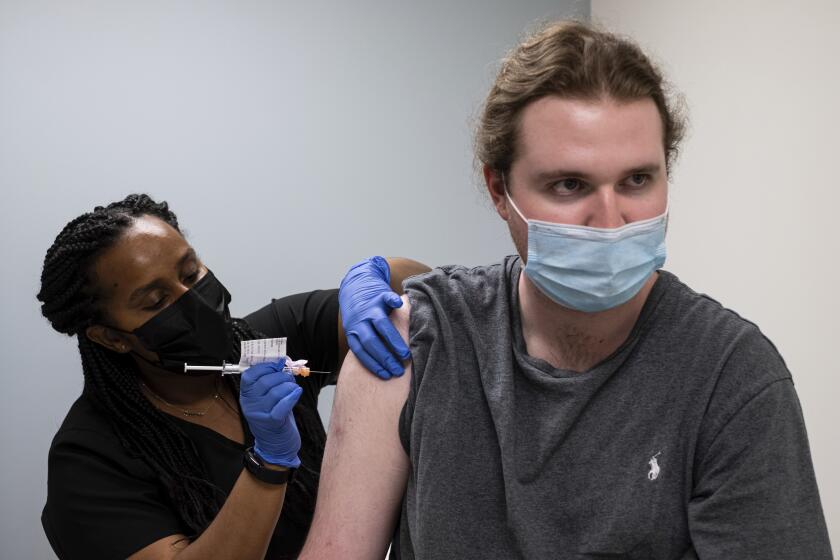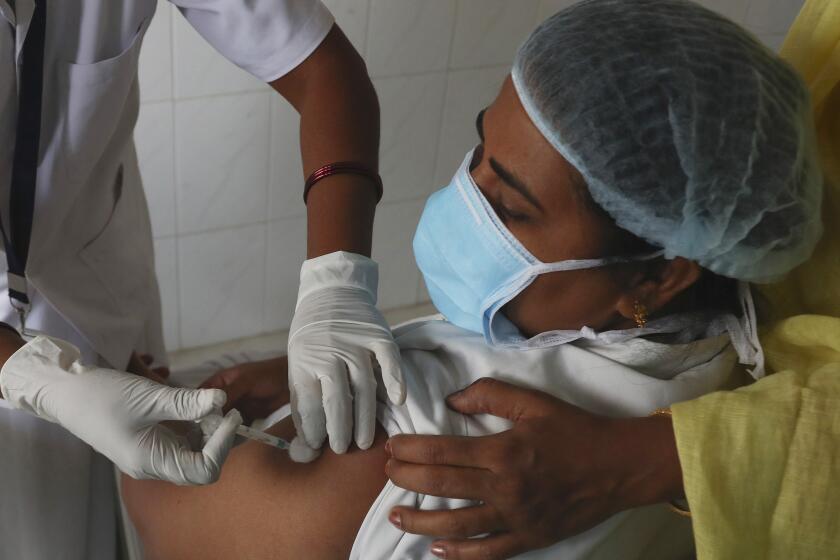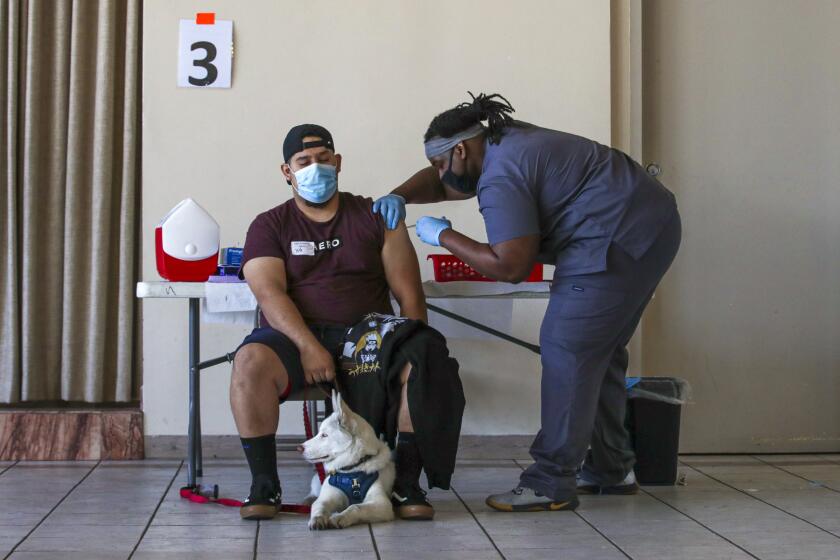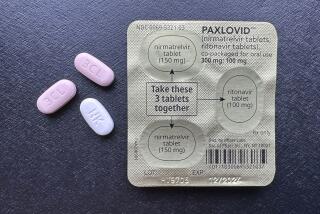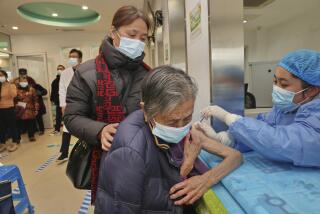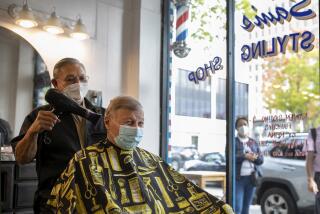India’s COVID-19 surge puts squeeze on world vaccine supply
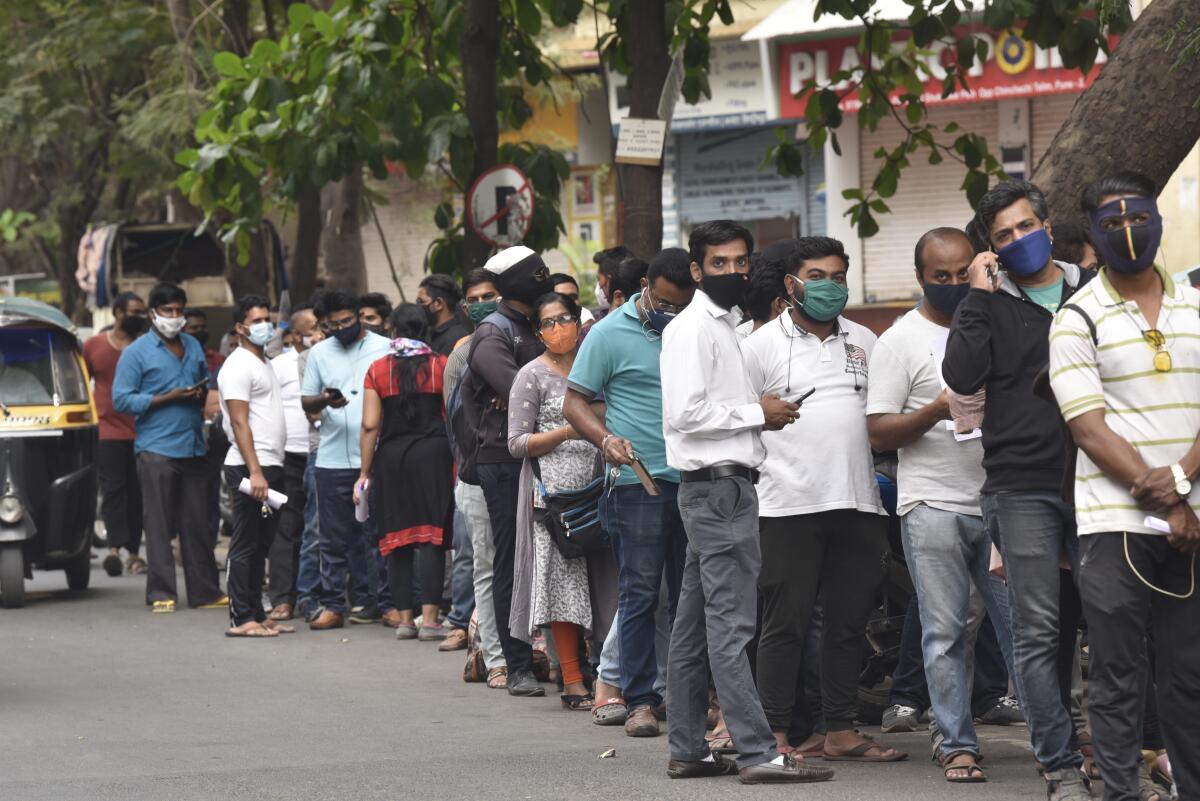
- Share via
NEW DELHI — The Indian city of Pune is running out of ventilators as gasping coronavirus patients crowd its hospitals. Social media are full of people searching for beds, while relatives throng pharmacies looking for antiviral medicines that hospitals ran out of long ago.
The COVID-19 surge across India is particularly alarming because the country is a major vaccine producer and a critical supplier to the international COVAX initiative to bring shots to some of the world’s poorest countries. Already, the rise in cases has prompted India to focus on satisfying domestic demand for COVID-19 vaccines — and delay deliveries to COVAX and elsewhere, including Britain and Canada.
India said Tuesday that it would authorize several new COVID-19 vaccines, but experts said the decision was unlikely to have any immediate impact on supplies available in the country. For now, its focus on domestic demand “means there is very little, if anything, left for COVAX and everybody else,” said Brook Baker, a vaccines expert at Northeastern University in Boston.
Pune is India’s hardest-hit city, but other major metropolises are also in crisis, as daily new infections hit record levels. Over the past week, India has averaged more than 130,000 new coronavirus cases per day. Experts say that missteps stemming from the belief that the pandemic was over are now haunting the country.
When infections began plummeting in India in September, many concluded the worst had passed. Masks and social distancing were abandoned, while the government gave mixed signals about the level of risk. When cases began rising again in February, authorities were left scrambling.
“Nobody took a long-term view of the pandemic,” said Vineeta Bal, who studies immune systems at Pune’s Indian Institute of Science Education and Research. She noted, for instance, that instead of strengthening existing hospitals, temporary sites were created. In Pune, authorities are resurrecting one of those makeshift facilities, which was crucial to the city’s fight against the virus last year.
New versions of COVID-19 vaccines are now being tested in case they ever are needed to protect against mutated versions of the virus.
India is not alone. Many countries in Europe that saw declines in cases are experiencing new surges, and infection rates have been climbing in every global region, partially driven by new coronavirus variants.
India has now reported 13.5 million virus cases since the pandemic began, pushing its cumulative caseload past Brazil’s and making it second only to the United States’, though both countries have much smaller populations. Deaths are also rising and have crossed the 170,000 mark. Those figures, experts say, are likely an undercount.
Nearly all states are showing an uptick in infections, and Pune — home to 4 million people — was left with just 28 unused ventilators Monday night for its more than 110,000 COVID-19 patients.
The country now faces the mammoth challenge of vaccinating millions of people, while also contact-tracing the tens of thousands getting infected every day and keeping the health system from collapsing.
India’s use of a homegrown COVID-19 vaccine about which little data have been released has raised eyebrows among residents and healthcare workers.
Compounding concern is the fact that the vaccination drive could also be headed for trouble: Several Indian states have reported a shortage of doses even as the federal government has insisted there’s enough in stock.
Worries about vaccine supplies have led to criticism of Prime Minister Narendra Modi’s government, which has exported 64.5 million doses to other nations. Rahul Gandhi, the face of the main opposition Congress party, asked Modi in a letter whether the government’s export strategy was “an effort to garner publicity at the cost of our own citizens.”
Now, India has reversed course. Last month, COVAX said shipments of up to 90 million doses of the AstraZeneca COVID-19 vaccine were delayed because the Serum Institute of India decided to prioritize domestic needs.
The institute, which is based in Pune and is the world’s largest vaccine maker, said earlier this month that it could restart exports of the vaccine by June if new coronavirus infections subsided. But a continued surge could result in more delays.
After a sluggish start, India recently overtook the U.S. in the number of shots given per day, which is now averaging 3.6 million. But with more than four times the U.S. population, it has given at least one dose to only about 7% of its population.
India’s western Maharashtra state, home to Pune and financial capital Mumbai, has recorded nearly half of the country’s new infections in the past week. Some vaccination centers in the state turned away people because of shortages.
At least half a dozen Indian states are reporting similarly low stocks, but Health Minister Harsh Vardhan has called these concerns “deplorable attempts by some state governments to distract attention from their failures.”
India’s latest coronavirus surge is most likely being fueled by more infectious variants, experts say. Health officials confirmed last month that 80% of infections in the northern state of Punjab were due to the version of the coronavirus first detected in Britain. There’s also increasing concern about another new and potentially troublesome variant that was first detected in India itself.
With coronavirus cases and related hospitalizations climbing nationwide, is California also headed for a fourth wave in the COVID-19 pandemic?
At the same time, Modi’s Hindu nationalist government has allowed huge gatherings for Hindu festivals like the Kumbh Mela, where millions of devotees daily take a holy dip in the Ganges River.
Dozens of cities and towns have imposed partial restrictions and nighttime curfews to try to curb infections, but Modi has ruled out the possibility of another nationwide lockdown. He also rejected calls from states to offer vaccinations to younger people.
More to Read
Sign up for Essential California
The most important California stories and recommendations in your inbox every morning.
You may occasionally receive promotional content from the Los Angeles Times.
